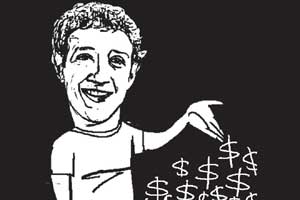Most reactions to the news that Facebook founder Mark Zuckerberg, and his researcher-spouse, Priscilla Chan, will, in the course of their lives, give 99% of the stock they hold in the social media company, currently valued at $45 billion, to a charity controlled by them, have either been wildly celebratory or churlish in their criticism. While it is true that the Chan-Zuckerberg household—with their new-born daughter, Maxima, whose birth marked the announcement—is the current star of the expanding universe “philanthrocapitalism”, critics are speculating about possible motives, from tax dodging to influencing public-policy.
Many argue that, had Chan-Zuckerberg encashed the stock, they would have had to pay a capital gains tax that would have aided many government-run welfare programmes, as would have a sizeable estate tax, had they willed the stock to their descendants. Also, as per US tax law, the couple will receive credits equal to the stock’s market value on the day they donate it to the Chan Zuckerberg Initiative, a limited liability corporation (LLC). Some of these credits can be rolled over to protect income such as Zuckerberg’s yet-unearned salary from Facebook. Though this cover will only be partial, the sum involved could be huge.
Moreover, the LLC structure will give the couple a significant say over what causes the charity endorses, meaning even if the Initiative starts out as non-partisan, the money involved in philanthrocapitalism guarantees donors a greater sway over public policy than ordinary citizens. But if we go by the precedents set by Western philanthrocapitalists—the phenomenon is, by no means, a rarity elsewhere; India, for example, has the Tatas, among others—the Initiative could leave the world a better place. The exemplary work done by the Bill & Melinda Gates Foundation, especially in curbing HIV/AIDS, shows Chan-Zuckerberg the path to changing the world.
